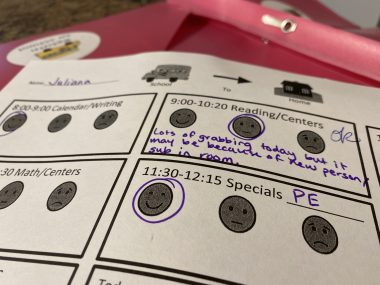Pushing Past Stressful Angelman Behaviors
Written by |

Singer Kelly Clarkson’s song “Stronger (What Doesn’t Kill You)” came to mind as I watched my 12-year-old Angel, Juliana, blow yet another raspberry into the air. I shook my head and ignored the gesture.
Raspberries are tart with a little sweetness. That’s a good way to describe our current season as Juliana goes through a rough patch of challenging behaviors. She’s doing lots of grabbing, screaming, and crying at home and at school. We have experienced this before, and I know it will pass. In the meantime, I’m working through some creative ways to cope.

Juliana is having more days with neutral progress reports as she wades through some tough behaviors. (Photo by Sabrina L. Johnson)
Angels can have challenging behaviors. The hyperactivity, irritability, and outbursts they exhibit can be very stressful to manage and live with. Results from an Angelman natural history study published in the American Journal of Medical Genetics in 2019 and reported by Angelman Syndrome News’ Ana Pena also provide proof that these behaviors may increase as an Angel gets older.
It feels like Juliana’s heightened behavior has gradually snuck up on us. Some changes may be hormones as her preteen body changes. It’s hard to know for sure. Honestly, I’m not spending a lot of time answering the question why.
Instead, I’m focusing on distractions that take me away from raspberries. I like raspberries, but they are better when I’m eating them or putting them in a smoothie — not when my kid is blasting them in my face.
Strategy No. 1
My first coping mechanism is to focus continuously on all the great things that Juliana is doing. In a recent column titled “Birthdays Are a Great Reminder of What My Angel Can Do,” I highlighted many things that Juliana is doing well.
I’ve been looking at baby pictures and old photos that conjure up lots of sweet memories. Since Juliana’s behavior isn’t just limited to home, I shower her with praise when she’s had a better day at school.
Strategy No. 2
I’ve discovered the art of shoshin, a mindfulness practice that really helps. A Japanese concept that translates as “beginners mind,” shoshin helps people see things from a more open, positive, and even playful mindset. I think I’ve been doing a form of shoshin for some time but didn’t have a name for it.
A 2013 study of special needs parents shows how practicing mindfulness helped them reduce stress and increase their well-being. Shoshin has proven to be a concept with merit and benefits. I’ve been so impressed with the strategy that I’m doing an eight-week self-study of it. In eight weeks, I’ll be so Zen-like that I probably won’t notice the raspberries. Only time will tell.
Strategy No. 3
Finally, I take random moments to give Juliana a hug or sweet kiss. This is a physical way for me to stop and express gratitude for the sweetheart she truly is. She’s been giving me more hugs than usual, so maybe it’s her way of saying, “Sorry I’m being so fussy, Mom. But you know I still love you.”
Sometimes, I’ll even give her a little wave or blow a kiss across the room. These physical gestures help me show love to her despite the upsetting behavior she is displaying.

Tart then sweet. Minutes after a loud crying jag, Juliana happily enjoys breakfast. (Photo by Sabrina L. Johnson)
That chaotic behavior is our world right now, and the idea is to avoid letting the stress get to us. Stress is high in special-needs families, a fact my husband and I distinctly understand. So we are on high alert to focus our attention on more positive things to balance out behavior that we can’t really control. Deep breaths help a lot, too.
I know Juliana will come through this fog eventually. Patience and distractions will help. We saw some similar behaviors around ages 2 and 3. And then, like magic, we were back to a normal state. Normal for Angelman syndrome, that is.
I know this season in our lives won’t last forever. We’re pretty good at waiting for things to happen around here. What doesn’t kill you makes you stronger, right? That’s such a great line for facing difficulties, including the challenging behaviors we parents sometimes face from our Angels.
Note: Angelman Syndrome News is strictly a news and information website about the disease. It does not provide medical advice, diagnosis, or treatment. This content is not intended to be a substitute for professional medical advice, diagnosis, or treatment. Always seek the advice of your physician or other qualified health provider with any questions you may have regarding a medical condition. Never disregard professional medical advice or delay in seeking it because of something you have read on this website. The opinions expressed in this column are not those of Angelman Syndrome News or its parent company, Bionews, and are intended to spark discussion about issues pertaining to Angelman syndrome.







Leave a comment
Fill in the required fields to post. Your email address will not be published.